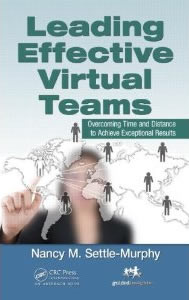Every day brings new fires Amy has to put out.
Yesterday it was yet another corporate policy calling for mandatory office time, prompting employees to ping her throughout the day. Earlier today, two of her top employees let her know they’re thinking about leaving. And she positively dreads her all-hands meeting tomorrow, when she’ll have to tell her team that she may have make future cuts if demand doesn’t pick up.
Having difficult conversations is nothing new for Amy, a well-regarded business unit manager. What is new is that her 15-person team is now scattered around the region, with few people showing up in the office where everyone once worked. Given her team’s relatively smooth transition to virtual work when COVID first hit, Amy wasn’t prepared for the complex challenges of leading a hybrid team.
By the end of the day, Amy is so exhausted that soon after getting dinner on the table, she collapses into her favorite chair, half-listening to her family’s banter. She suddenly remembers an email she got from her manager earlier this week, saying she must attend some kind of “hybrid leadership skills training” on Friday morning, when she was actually hoping for a little downtime with her family. She clicks to view her calendar, muttering, “Fat chance.”
Leading a hybrid team can be a lot harder than leading a team where everyone works either remotely or altogether in the same place. Most managers need special skills and knowledge many simply haven’t developed yet. This, according to more than 40 senior HR, talent management, learning and development and other business leaders I interviewed over the past few months. (See the first link below to download a summary report.)
It’s not that managers don’t know they need these skills or that they don’t want them. They’re just fighting too many challenges at once to make the space.
“Our managers are completely overwhelmed,” said one HR VP, echoing the sentiments of many of her peers. “They don’t have a chance to take on anything new unless it’s something that helps them put out the fire that’s right in front of them that very minute.”
What makes today’s leadership challenges so different from those in the past? It’s the sheer number and magnitude of challenges hitting managers all at once, including:
🔥 Maintaining equity and inclusivity across the team in an inherently asymmetrical world
Successfully addressing these challenges requires not only requires specialized knowledge and skills. Managers also need the right attitudes, mindsets, beliefs and behaviors to be successful leaders in a hybrid world, such as:
↗️Communicates clearly, with intention
If only there were “best leadership practices” that could be applied universally. But most organizations simply don’t have enough experience operating with a hybrid model to declare unequivocal success, and many have had very different starting points. And since leadership practices need to reflect the values and culture of their organizations, trying to force-fit a set of leadership practices that work equally well for a fast-growing high-tech company and a small regional nonprofit can be a costly exercise in futility.
Essential ingredients for success – The “secret sauce”
How can senior leaders help managers like Amy, who’s feeling immense pressure to juggle so many balls at once: Leading her team during a time of tumult and transition while meeting performance goals, keeping employees happy enough to stay, and making sure team members are taking care of themselves?
🔑 Check in, often. Even if managers say everything’s okay, take the time to find out how they’re really doing. What can you do to support them? How can you help support their team members? What’s in their power to change, and where do senior leaders need to get involved?
Managers who felt confident and competent in a traditional workplace may need more help than you think to navigate today’s hybrid workplace. Don’t assume they’re okay if you don’t hear from them. Chances are, they may not want to admit they’re floundering, especially if everyone else seems to say they’re doing fine.
I work with teams of all types, sizes and locations to help their managers become successful leaders in a hybrid world. If you could use some help, please email nancy@guidedinsights.com to set up time to talk, or visit my website to find out more.
Links
Downloadable PDF file from Guided Insights:
- Essential Skills for Today’s Hybrid Leaders – downloadable PDF summary report of my interviews with HR, talent management, learning and development, and other business leaders
Past Communiques from Guided Insights:
- To Build Trust Within Virtual Teams, Psychological Safety Is Everything – Guided Insights
- From Bland and Boring to Captivating and Compelling – Guided Insights
- Get New Team Members Up To Speed Quickly – Guided Insights
- Overcoming Time and Distance to Stay Connected, Engaged and Energized – Guided Insights
- Speaking the Truth Not Always Easy in a Virtual World – Guided Insights
Workshops from Guided Insights – all customized for each client




